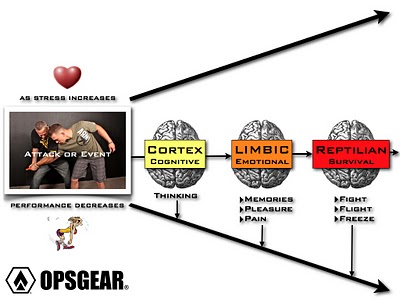 TacTalk is a weekly publication which can be found at the official Opsgear website. Please visit their website if you would like to read more articles like this in the archives.
TacTalk is a weekly publication which can be found at the official Opsgear website. Please visit their website if you would like to read more articles like this in the archives.
If You Have Seen It On TV, Can YOU Do It?
By David “Jager” Burnell
Founder and CEO, OPSGEAR®
Let me begin by stating that I have operated a premier force-on-force (human-vs-human) facility for many years training Federal Agencies, SWAT, Police, Soldiers and Airman in close contact fighting. While I may not be a brain surgeon, I have become a subject matter mentor in stress inoculation and behaviors under stress. Operating the Urban Warfare Center®, our elite force-on-force facility has driven home many lessons. The key point I want to make in this article is that the brain has many functions and some of them decline rapidly in a fight. I have seen this in business, conflict, fights, training, rescue missions and recently on my deployment to Haiti. This declination of the brain along with some physiological changes is what causes our performance to decrease. Don’t worry to much about where the brain functions are located or even the terminology, just get the concept that you have compartments in your brain that are responsible for key functions and that effective training can help you increase performance even under heavy stress. Special Operations personnel get huge amounts of stress in selection and followup training for this very purpose. Instructor cadre are determining if they have the makeup to “fight through” the trauma to the brain and body, as well as the desire to build muscle memory through repetition.
As we experience a traumatic event or stress, our heart rate increases and our performance decreases. Large muscle groups get vital blood supplies and adrenaline is rushed to the larger muscle groups in order to facilitate fight, flight or freeze responses to fear or danger.
 We rapidly decline based on our conditioning, training and experience from the COGNITIVE brain functions of thinking rationally down through the EMOTIONAL and then to the SURVIVAL part of our brains. This means that where we use to be able to think and function at the highest level without any fog we now must depend on the lower brain functions that drive the larger muscle groups and perform mainly on muscle memory. When this happens fine motor skills like the fingers do not work as well and visual and audible acuity is reduced or completely absent. If you have ever experienced a moment where you didn’t see or hear things happening around you during a stressful situation this is what we are talking about. Classic stress drives the brain functions to the lowest levels. With proper training and experience the opposite may even happen. Perhaps you have heard veterans or personally experienced how acute hearing and other senses become prior to a fight, that is an indication of experience or effective training. The brain is sensing danger and kicks into high gear all the survival functions mingled with high level thinking, and with this enhanced awareness you will for the most part not only survive the fight, but dominate it. It is the rookie or the new guy in the fight that is a grave risk because he has no frame of reference in his brain, no similar experience to what is currently happening. He can only rely on others (veterans) or his training if it was effective to index a related memory and apply the lessons learned. If he has not had effective training and he survives his first contact or fight, he will now have a permanent memory on file that will enable him to use that experience in the future.
We rapidly decline based on our conditioning, training and experience from the COGNITIVE brain functions of thinking rationally down through the EMOTIONAL and then to the SURVIVAL part of our brains. This means that where we use to be able to think and function at the highest level without any fog we now must depend on the lower brain functions that drive the larger muscle groups and perform mainly on muscle memory. When this happens fine motor skills like the fingers do not work as well and visual and audible acuity is reduced or completely absent. If you have ever experienced a moment where you didn’t see or hear things happening around you during a stressful situation this is what we are talking about. Classic stress drives the brain functions to the lowest levels. With proper training and experience the opposite may even happen. Perhaps you have heard veterans or personally experienced how acute hearing and other senses become prior to a fight, that is an indication of experience or effective training. The brain is sensing danger and kicks into high gear all the survival functions mingled with high level thinking, and with this enhanced awareness you will for the most part not only survive the fight, but dominate it. It is the rookie or the new guy in the fight that is a grave risk because he has no frame of reference in his brain, no similar experience to what is currently happening. He can only rely on others (veterans) or his training if it was effective to index a related memory and apply the lessons learned. If he has not had effective training and he survives his first contact or fight, he will now have a permanent memory on file that will enable him to use that experience in the future.
KEY ISSUE: When we use fine motor skills in a fight, they FAIL because the brain is declining and blood is going to larger muscles, our stress response (heart rate increase) is driven even higher than normal because now our brain is struggling to grab for something else that will work. An audible yell such as STOP during an assault will often drive the brain back up into a cognitive state and get us moving in the right direction to either break contact or fight the assailant. It also forces us to breath which is critical to send oxygen to the tissues, brain and heart so we can perform. Because of this GROSS MOTOR movements such as elbows, broad kicks and sweeping strikes are critical to develop skills. Simply said “gross motor movements survive the decreased brain functions, failed first strikes and can be repeated quickly when one strike does not stop the threat.”
With the Urban Warfare Center® and now FREE Tactical Tips (www.freetacticaltips.com) it is our goal to help you have experiences in a “controlled chaos” environment. This will allow you to safely file away seemingly real-world experience without the inherent risk. Most of the skills we teach are also grounded in large muscle groups and simple to remember and apply under stress.
SUMMARY: The classic response to fear or danger is experienced by all people, but can be reduced or managed by stress induced training and slow repetitive muscle memory drills. This is why in our tactics we practice all of our movements with slow controlled movements until we know them well. We then add some stress by a partner increasing his speed on the assault or the distractions of sight, sound, taste, touch and smell. This type of training will increase memory retention and shorten training time.
It is possible with sufficient training and experience in conflict to manage stress responses more effectively and thereby forcing higher level brain functions to continue. This is evident in combat veterans or 911 personnel that have had sustained exposure to stressful environments. These veterans become calmer than newly exposed personnel and are generally more effective in a fight because they are accustomed to the immediate adjustments they must make in the brain and body to be successful.
RECOMMENDATION: It is my opinion that ALL combative training should focus primarily on gross motor movements that are resilient to decreased brain functions, and include a stress component such as sight, sound, taste, touch or smell.
KEY BULLETS:
- When attacked heart rate increases and performance decreases
- The brain function decreases rapidly
- The lowest brain function produces Fight, Flight Freeze
- In FFF mode you are left to muscle memory
- Muscle memory is obtained by seeing, hearing and doing repetitively
- Large muscle groups should be primary focus for developing skills
- Effective training WILL enhance survivability
THREE BRAIN THEORY SUMMARY
CORTEX – COGNITIVE
The third brain is the CORTEX and it is mainly intellectual and responsible for our high level thinking and cognitive functions. It is noted in yellow as it is the part of the brain that can identify threats before they happen using the Color Code of Mental Awareness Color YELLOW.
LIMBIC – EMOTIONAL
The second brain is the LIMBIC and is the emotional part of the brain. It drives decisions based on pleasure and pain. The LIMBIC contains a file cabinet of all of our permanent memories and is one of the places that our life experiences are stored. In the absence of a similar experience to the threat and through effective training this part of the brain can store the “training or simulated experience” as if it were a real one. When a fight begins this experience will be indexed and the training response will be performed. “you will fight how you train.”
REPTILIAN – SURVIVAL
The third brain is the REPTILIAN and is the lowest of all functions. This is where the survival behaviors of fight, flight or freeze are stored.
ATTENTION READERS
We See The World From All Sides and Want YOU To Be Fully InformedIn fact, intentional disinformation is a disgraceful scourge in media today. So to assuage any possible errant incorrect information posted herein, we strongly encourage you to seek corroboration from other non-VT sources before forming an educated opinion.
About VT - Policies & Disclosures - Comment Policy



